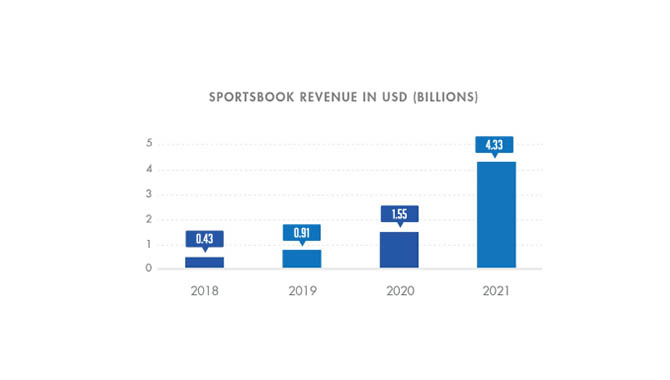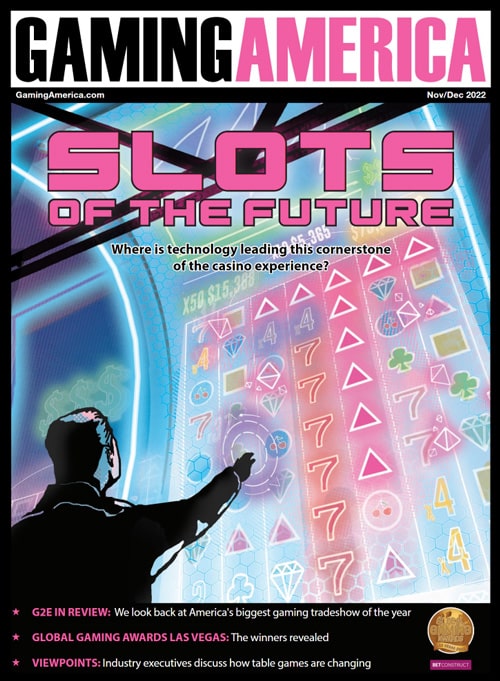
The industry is far past the inflection point, where the focus of sports betting operators shifted from vertical integration to customer acquisition. The most prominent brands and operators have pushed nearly incomprehensibly sized promotional and marketing budgets to support the war for US sports bettors’ loyalty (or even just attention).
These global gaming titans shape the sports betting industry in the markets in where they operate. Just look at the chart below for the 2020 data of the top six leading operators by revenue.

The Brands Battle for Hearts, Minds and Deposits
What’s at stake for these giants and their new sports book operations in the US? The next chart shows the revenue from commercial casino operators as it grew from 2018 to 2021.

That $4.3bn in commercial sports book revenue came from sports fans across the US who bet on their favorite sports – part of the 46% of American adults (a population of over 106 million) with “at least some interest in sports betting.” The US is far from done unlocking markets. Goldman Sachs projects 40% annual growth over the next decade, with many more US states regulating sports wagering for their citizens. Furthermore, understanding that the size of the commercial gaming market is around half of the total US gaming market, with the majority coming from tribal gaming operators, the whole picture could be double that amount.
Therefore, given the size and value of the US sports betting market, the speed of its growth, and its role in acquiring and retaining new demographics for these gaming giants, the investment in the market warfare is, and will continue to be, multidisciplinary.
The Channels are the Battlefields:
Micro betting joins the suite of markets, extending the options of traditional sports bettors in the United States. We are increasingly reaching sports bettors through multiple channels -- brick and mortar sportsbooks, quick bet terminals, mobile on-premise and online wagering.
The Markets are the Soldiers: Across those channels, we’re offering in-play wagering, spreads, fixed odds, pari-mutuel wagering, fantasy sports wagering and, most recently, exchange betting with Prophet Exchange and Sporttrade in New Jersey.
The Sports are the Flags they Carry: We make these markets for an ever-growing list of sports of interest to the US bettors, including emerging niche sports to US sportsbooks, such as pickleball, frisbee golf, darts, skateboarding, surfing and esports.
Defining and Differentiating Micro Betting from In-Play Wagering
Let’s start with definitions. Micro betting is a subset of in-play wagering. According to standard convention, what sets them apart is micro-betting markets which:
- Do not directly relate to mechanics determining who wins and who loses
the game. - Describes an event about to happen and whose duration is short; eg, a single pitch in baseball or the subsequent free throw in a basketball game.
Micro betting, or betting on specific game outcomes, has become an increasingly popular part of the legal sports betting industry. This type of wagering allows players to place bets on individual plays, yardage or drives. These bets tend to be smaller than traditional bets, and they’re ideal for the whims of millennials and younger gamers. Micro betting apps like Betr, which is marketed as a TikTok for sports betting, cater to people with short attention spans.
Thinking about customers holistically is essential, but we need specialized marketing teams supported by machine learning-powered CRM platforms to help these sportsbook operators tactically. Micro betting has become popular in the US because it provides an exciting experience for fans. Micro-betting companies can improve their odds by analyzing underlying data feeds, fan behavior, and bet history before then converting the data into micro-betting opportunities. This allows users to experience a better, more customized betting experience. The need to extend the role of marketing operations into operational support roles for sports wagering operators has never been more critical.
This increasing complexity of the sports betting experience and the development of its long tail of options are all in service of product diversification and the ability to attract the widest audiences to their brands, player account management systems and wallets.
The Value of Micro Betting to Consumers
Simple, Low-Risk Point of Entry. Traditional prop bets focus on teams, players and games. In addition, these bets must wait until the game has concluded to be settled. Sports bettors, especially novice participants, love micro-betting’s clarity, excitement and immediacy. They don’t have to understand the entire rule set of a particular sport, nor do they need to wait for the whole game to resolve. I’m betting on something simple and sweet, like, whether or not the basketball player, ball in hand and ready to throw, will make or miss their shot. Will the pitcher’s next throw exceed 100 miles per hour? Discrete bites of excitement pay off quickly and trigger more endorphins than winning a contest with a long payoff period.
The Value of Micro betting to Sports Books
Attracting new customers. Bettors don’t need any expertise in a sport. They’re betting on a discrete, immediately observable outcome that will be resolved imminently, quickly and with a relatively low barrier to entry in terms of the amount bet. This is a fantastic tool to attract new, casual sports bettors.
Increased Handle. Micro betting and live in-play wagering had much the same effect in sportsbooks that the near-incomprehensible multi-reel slot games, with hundreds or more pay lines, had on slots. It has a transformative impact on betting volumes. The faster these micro bets resolve, the quicker the bettor is put back into play for the next one. The next question is, how many micro-betting markets can we create while managing risk for the sportsbook?
Cost-Efficient Scalability through Tech: That next hurdle - scalability - is modeling and automation so that available micro-betting markets in any game can be expanded to meet consumer demand. New companies are bringing machine learning and artificial intelligence-driven products to sportsbook operators to help them set probabilities and lines for every possible micro-betting or in-play wagering event in the majors. Once this is mastered, it will only expand from there.
Fast Growing Share of Sports Betting Handle: Simplebet co-founder Joey Levy reported that its client, DraftKings, “...accounted for more than 30% of the sportsbook’s college football handle,” and “For Super Bowl LVI, micro betting made up more than a quarter of [DraftKing’s] in-play betting handle.” Given the propensity of micro betting to continue to resonate with younger sports fans, who are not yet avid sports book customers, this is a target-rich demographic for player acquisition.
The data and the rich anecdotal narratives we receive from our clients and partners in the industry send us a clear message. We will continue to pursue best-in-class tools and technologies to support micro betting for our friends in sportsbook operations throughout the US.
We will test these solutions rigorously for their operational practicality:
- Will the platform integrate with the sportsbook management system’s modules and AI/machine learning-powered CRM platform?
- Does the product intelligently and transparently manage itself, or does it require an army of consultant services to maintain integration and operations?
- Does the value the solution brings sufficiently offset any additional effort or attention the marketing, risk management, and trading teams must expend?
The best-in-class technologies for micro betting will have to clear all three hurdles to become a practical part of any sports betting operation.

